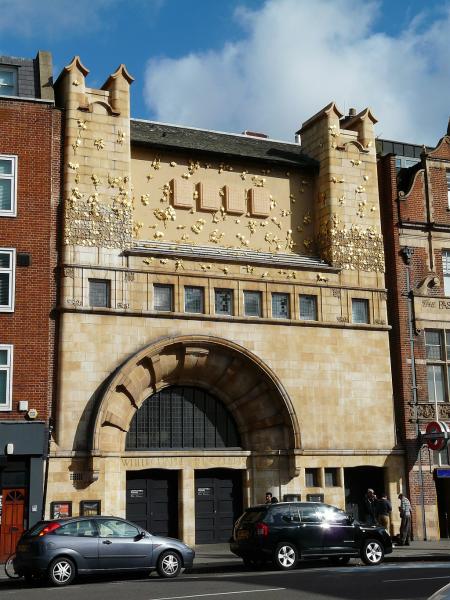
Performers' union Equity coordinated a campaign to try to save Oldham Coliseum
Photo: Equity
Closures and cutbacks as National Portfolio 2018-23 concludes
As a new National Portfolio for 2023-26 begins, Arts Professional examines the fortunes of the organisations that lost out on funding in this round.
In the current economic climate, the implications of Arts Council England's (ACE) funding decisions for the 2023-26 portfolio were always going to be significant for those whose applications were unsuccessful.
The news last November that 130 previously-funded organisations lost all funding, and 35 of those that retained their NPO status suffered cuts of £50,000 or more, triggered a range of responses.
Closures, cutbacks and consolidation have been taking place at rapid pace over the five months since, with organisations outside the portfolio – many of which applied for NPO status – also affected.
READ MORE:
New figures, supplied to Arts Professional by ACE, confirm that 82 organisations applied for Transition Funding to help them either to move to a new funding model or to "wind down". All 82 applications were approved and received a total of £10.4m of investment.
There is no publicly collated data on how many closures or redundancies have occurred since last November, but it is clear that numerous arts and culture organisations are having to make tough decisions.
Closures
The most high profile closure of a former NPO is Oldham Coliseum which shut its doors for the final time last week after losing all its £600,000 a year funding from ACE.
Unlimited Theatre company, based in Leeds, will close at the end of the year after 25 years, following the loss of its funding. A member of the National Portfolio since 2008, it received £169,176 from ACE in 2022/23.
It currently has four permanent members of staff, two producers and five retained freelance core artists, as well as other contracted freelancers. Staff will be made redundant by the end of the year as part of the winding down process.
Another to close is Sheffield-based theatre company Third Angel established 27 years ago. It will shut down this summer, citing a lack of regular funded from ACE as a "significant factor", but adding "it was not the deciding one".
Organisations not part of the previous portfolio, but applying unsuccessfully for inclusion in the 2023-26 iteration have also been affected.
Less than three weeks after the funding announcement, touring theatre company Wildcard announced the "devastating" closure of its central London rehearsal studios, after the charity’s application was rejected.
The charity opened Wildcard Studios, which provides heavily subsidised rehearsal space, just off Oxford Street in July 2019. It closed in December.
Speaking at the time to The Stage co-Executive Directors of the charity Tom Ratcliffe and Jenna Fincken, said: "We were acutely aware of how competitive London was going to be in this round of funding, given the millions being redistributed as part of ‘levelling up’.
"We knew going for NPO was a gamble but it was one we simply had to take."
Redundancies
Other organisations have had to cut their cloth to accomodate reductions in income.
Senior staff were among those to go at Whitechapel Gallery. Affected roles included Chief Curator Lydia Yee and Candy Stobbs, who was a member of the curatorial team for over 20 years, plus another curatorial role.
Members of the gallery’s development department and the most senior role in commercial ventures have also lost their jobs.
The gallery has attributed the decision to rising energy costs and pressing environmental and social concerns, as well as a reduction in its regular Arts Council England (ACE) funding.
Although it retained its National Portfolio status, its annual ACE funding will drop from £1.51m to £1.44m for 2023-26.
 Whitechapel Gallery, London Borough of Tower Hamlets. Photo: GrindtXX/Wikipedia Commons
Whitechapel Gallery, London Borough of Tower Hamlets. Photo: GrindtXX/Wikipedia Commons
Elsewhere, Artistic Director Roxana Silbert took the decision to step down as a result of a 100% funding cut for Hampstead Theatre, worth £766,455 a year.
The theatre said it will “need to change direction and can no longer continue solely as a new writing theatre”. It has since closed its new Literary and Participation department.
Other organisations have had to rethink what they can produce in light of funding restraints.
This includes Glyndebourne, the East Sussex opera house which has decided not to tour its productions around the country in 2023 following a 50% cut to its ACE funding.
Likewise, the National Theatre, which recieved a 5% cut in its ACE funding, has said it will "need to reduce its activity for three to four years to ensure financial stability".
Outside the portfolio
Organisations outside the National Portfolio have also been struggling.
Side Gallery, based in Newcastle upon Tyne, which has been showcasing documentary film and photography for 45 years, has said it will close to the public as of 9 April due to "critical funding cuts and the cost of living crisis".
"Our small team are doing everything possible to secure additional funding so that we can eventually re-open to the public. However, our future is uncertain, and we now face the possibility of permanent closure," a Crowdfunding campaign launched by the gallery states.
Other arts and culture organisations to have closed in recent months include:
- Artistic Directors of the Future, a charity that worked to increase leadership representation of arts professionals from the Global Majority
- The Light House in Wolverhampton, an independent cinema and arts venue that had been running for 35 years
- Eastleigh Museum in Hampshire, which is currently closed. Hampshire Cultural Trust is in discussions with both Eastleigh Borough Council and Hampshire County Council regarding the long-term future of the museum
Situation in Scotland
There has also been significant turmoil in Scotland where arts and culture organisations are also facing a challenging funding climate.
The Scottish Government had planned to cut funding for grant making body Creative Scotland by 10%, but reversed the plans in the face of widespread concerns about the impact such a move would have.
But this political victory will be of little consolation to a number of organisations in Scotland that have closed and made cutbacks in recent months.
In October the Edinburgh International Film Festival was shut down with immediate effect after the charity that runs it, the Centre for the Moving Image (CMI), announced it had ceased trading and called in administrators.
Filmhouse Cinema and Café Bar in Edinburgh, and Belmont Filmhouse in Aberdeen also ceased trading as a result.
The King’s Theatre in Edinburgh was saved from closure in February after it secured securing emergency funding from City of Edinburgh Council and the Scottish Government to carry out essential redevelopment work.
However, just last week the Edinburgh Fringe Festival Society issued a stark warning that the world-famous event is at "crisis point" and requires ongoing government support to remain economically viable.
With local authority funding decisions for arts and culture for the 2023/24 financial year filtering through, the fear is that more arts and culture organisations will face the prospect of closure in the coming months.
Join the Discussion
You must be logged in to post a comment.